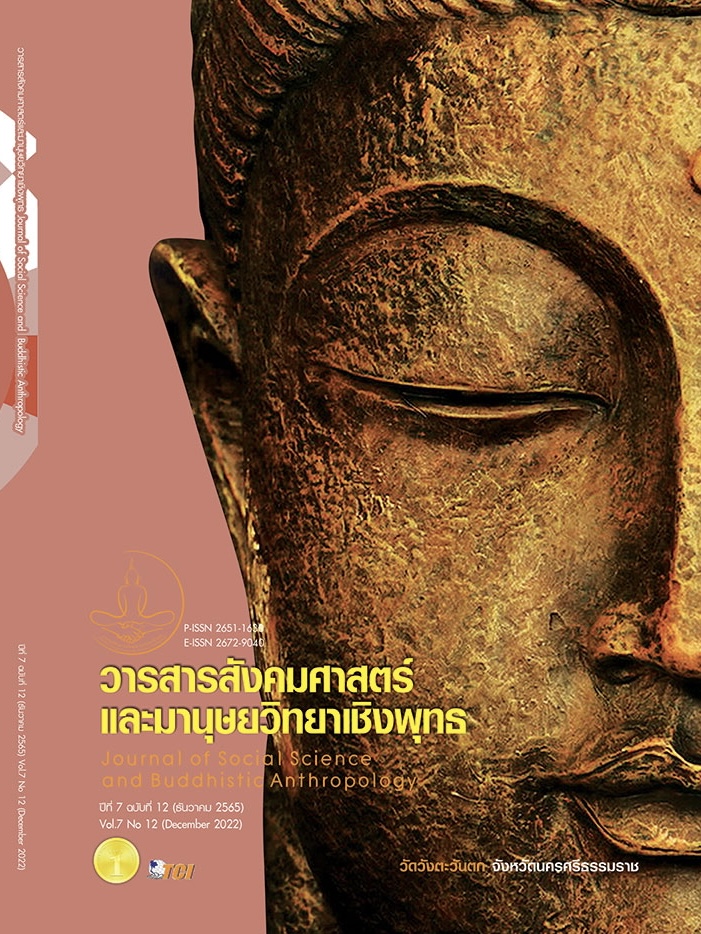รูปแบบการบริหารสถานศึกษาเอกชนระดับปฐมวัย ภายหลังการแพร่ระบาดของโรคติดเชื้อไวรัสโคโรนา 2019 (โควิด-19) ในเขตกรุงเทพมหานคร
คำสำคัญ:
การบริหารสถานศึกษาเอกชน, ปฐมวัย, โรคติดเชื้อไวรัสโคโรนา 2019 (โควิด-19)บทคัดย่อ
บทความวิจัยนี้มีวัตถุประสงค์เพื่อ 1) ศึกษาสภาพปัญหา อุปสรรคการบริหารสถานศึกษาเอกชนระดับปฐมวัย ที่ได้รับผลกระทบจากการแพร่ระบาดของโรคติดเชื้อไวรัส โคโรนา 2019 2) ศึกษารูปแบบการบริหารสถานศึกษาเอกชนระดับปฐมวัย ภายหลังการแพร่ระบาดของโรคติดเชื้อไวรัสโคโรนา 2019 ผู้ให้ข้อมูลสำคัญ ได้แก่ ผู้บริหารสถานศึกษา และผู้รับใบอนุญาต จำนวน 8 คน กลุ่มตัวอย่าง ได้แก่ ผู้บริหาร ครู และผู้ปกครองของสถานศึกษาเอกชนระดับปฐมวัย สังกัดสำนักงานคณะกรรมการส่งเสริมการศึกษาเอกชน เขตบางเขน และเขตมีนบุรี ที่ได้จากการสุ่มแบบเจาจง จำนวน 8 โรงเรียน รวมเป็น 32 คน เป็นการวิจัยแบบผสานวิธี ดำเนินการวิจัย 2 ระยะ 1) ศึกษาสภาพปัญหา อุปสรรคการบริหารสถานศึกษาเอกชนระดับปฐมวัย และ 2) สร้างรูปแบบการบริหารสถานศึกษาเอกชนระดับปฐมวัย เครื่องมือได้แก่ แบบสอบถามปลายเปิด ข้อมูลเชิงปริมาณวิเคราะห์ด้วยโปรแกรมคอมพิวเตอร์ ข้อมูลเชิงคุณภาพวิเคราะห์การสัมภาษณ์เชิงลึก สถิติที่ใช้ได้แก่ ค่าเฉลี่ย ค่าความเบี่ยงเบนมาตรฐาน ผลการวิจัย พบว่า สภาพปัญหา อุปสรรคการบริหารสถานศึกษาเอกชนระดับปฐมวัย ที่ได้รับผลกระทบจากการแพร่ระบาดของโรคติดเชื้อไวรัสโคโรนา 2019 พิจารณาโดยรวม พบว่า มีค่าเฉลี่ยในระดับปานกลาง ( = 3.47) เรียงลำดับดังนี้ การปฏิบัติตามมาตรการทางสังคม (
= 3.71) การบริหารงานวิชาการ (
= 3.45) การแลกเปลี่ยนชุมชนแห่งการเรียนรู้ (
= 3.35) การนำเทคโนโลยีและนวัตกรรมมาใช้ (
= 3.31) รูปแบบการบริหารสถานศึกษาเอกชนระดับปฐมวัย รูปแบบ P-STR มี 4 องค์ประกอบ คือ P = Professional Learning Community (PLC) หมายถึง ชุมชนของการแลกเปลี่ยนเรียนรู้ทางวิชาชีพ S = Social Media หมายถึง สื่อสังคม (ออนไลน์) ใช้ในการติดต่อสื่อสารมีปฏิสัมพันธ์ T = Technology Disruption หมายถึง การนำเทคโนโลยีและนวัตกรรมมาประยุกต์ใช้ และ R = Relationship with parents หมายถึง ความสัมพันธ์ระหว่างสถานศึกษากับผู้ปกครอง
เอกสารอ้างอิง
กรมควบคุมโรค กระทรวงสาธารณสุข. (2564). แนวทางการบริหารจัดการ การควบคุมโรค ในสถานที่กักกันซึ่งทางราชการกำหนด (GUIDELINE FOR DISEASE CONTROL IN QUARANTINE FACILITIES) ฉบับปรับปรุง VERSION 4. (พิมพ์ครั้งที่ 1). กรุงเทพมหานคร: องค์กรสงเคราะห์ทหารผ่านศึกในพระบรมราชูปถัมภ์.
กรมอนามัย กระทรวงสาธารณสุข. (2563). แนวปฏิบัติสำหรับสถานศึกษา ในการป้องกันการแพร่ระบาดของโรคโควิด 19 ประเทศไทย. เรียกใช้เมื่อ 5 มกราคม 2564 จาก http://www.oic.go.th/FILEWEB/CABINFOCENTER17/DRAWER002/GENERAL/DATA0002/00002647.PDF
กระทรวงสาธารณสุข. (2563). แนวทางปฏิบัติด้านสาธารณสุขเพื่อการจัดการภาวะระบาดของโรคโควิด-19 ในข้อกำหนดออกตามความในมาตรา 9 แห่งพระราชกำหนดการบริหารราชการในสถานการณ์ฉุกเฉิน พ.ศ. 2548 (ฉบับที่ 1). เรียกใช้เมื่อ 5 มกราคม 2564 จาก http://www.stopcorruption.moph.go.th/application/editors/userfiles/files/.pdf
กองบริหารระบบบริการสุขภาพจิต. (2564). ประกาศมาตรการป้องกันการแพร่ระบาดโรคติดเชื้อไวรัสโคโรนา 2019 (COVID-19) กองบริหารระบบบริการสุขภาพจิต. เรียกใช้เมื่อ 30 พฤศจิกายน 2564 จาก http://mhso.dmh.go.th/fileupload/20211027925 864550.pdf
เทื้อน ทองแก้ว. (2563). การออกแบบการศึกษาไทยในชีวิตวิถีใหม่: ผลกระทบจากการแพร่ระบาด COVID-19. วารสารคุรุสภาวิทยาจารย์, 1(2), 1-20.
ธานินทร์ อินทรวิเศษ และคณะ. (2564). ภาพสะท้อนการศึกษาไทยภายหลังภาวะโควิด 2019. วารสารการบริหารนิติบุคคลและนวัตกรรมท้องถิ่น, 7(4), 323-333.
บุญชม ศรีสะอาด. (2556). การวิจัยเบื้องต้น ฉบับปรับปรุงใหม่. กรุงเทพมหานคร: สุวีริยาสาส์น.
ปิยะวรรณ ปานโต. (2563). การจัดการเรียนการสอนของไทยภายใต้สถานการณ์การแพร่ระบาดของโรคติดเชื้อไวรัสโคโรนา 2019 (COVID–19). กรุงเทพมหานคร: สำนักงานเลขาธิการสภาผู้แทนราษฎร .
ภูษิมา ภิญโญสินวัฒน์. (2563). จัดการเรียนการสอนอย่างไรในสถานการณ์โควิด-19: จากบทเรียนต่างประเทศสู่งการจัดการเรียนรู้ของไทย. เรียกใช้เมื่อ 5 มกราคม 2564 จาก https://tdri.or.th/2020/05/examples-of-teaching-and-learning-in-covid-19-pandemic/
รัตนา กาญจนพันธ์. (2563). การบริหารสถานศึกษาในสถานการณ์วิกฤตไวรัสโคโรนา 2019(COVID-19). วารสารดุษฎีบัณฑิตทางสังคมศาสตร์มหาวิทยาลัยรามคำแหง, 10(3), 545-556.
สมชาย พุทธโกสัย และคณะ. (2556). คุณภาพการบริหารจัดการสถานศึกษาระดับประถมศึกษาในเขตตรวจราชการที่ 2 กระทรวงศึกษาธิการ. วารสารสมาคมนักวิจัย, 18(2), 84-98.
สำนักงานคณะกรรมการการศึกษาขั้นพื้นฐาน. (2563). แนวทางการจัดการเรียนการสอนของโรงเรียนสังกัดสำนักงานคณะกรรมการการศึกษาขั้นพื้นฐานในสถานการณ์การแพร่ระบาดของโรคติดเชื้อไวรัสโคโรนา 2019 (COVID-19) ปีการศึกษา 2563. เรียกใช้เมื่อ 5 มกราคม 2564 จาก https://pccl.ac.th/home/?p=298
สุธรรม สุบรรณาจ และคณะ. (2556). ปัจจัยที่ส่งผลต่อความสำเร็จในการนำนโยบายการกระจายอำนาจการบริหารงานวิชาการไปปฏิบัติของสถานศึกษาในอีสานใต้. วารสารสมาคมนักวิจัย, 18(2), 29-41.
สุพริศร์ สุวรรณิก. (2563). ไวรัสโคโรนา: ฝันร้ายของเศรษฐกิจโลก ? เรียกใช้เมื่อ 5 มกราคม 2564 จาก https://www.bot.or.th/Thai/ResearchAndPublications/articles/Pages/ Article_24Feb2020.aspx
Ibrahim M. H. (2022). COVID-19 Global Humanitarian Response Plan: An optimal distribution model for high-priority countries. ISA Transactions, 124(5), 1-20.
World Economic Forum. (2020). The World Economic Forum COVID. Retrieved August 16, 2020, from https://www.weforum.org/agenda/2020/07/covid19-education-lockdown-children/
ดาวน์โหลด
เผยแพร่แล้ว
รูปแบบการอ้างอิง
ฉบับ
ประเภทบทความ
สัญญาอนุญาต
ลิขสิทธิ์ (c) 2022 วารสารสังคมศาสตร์และมานุษยวิทยาเชิงพุทธ

อนุญาตภายใต้เงื่อนไข Creative Commons Attribution-NonCommercial-NoDerivatives 4.0 International License.









